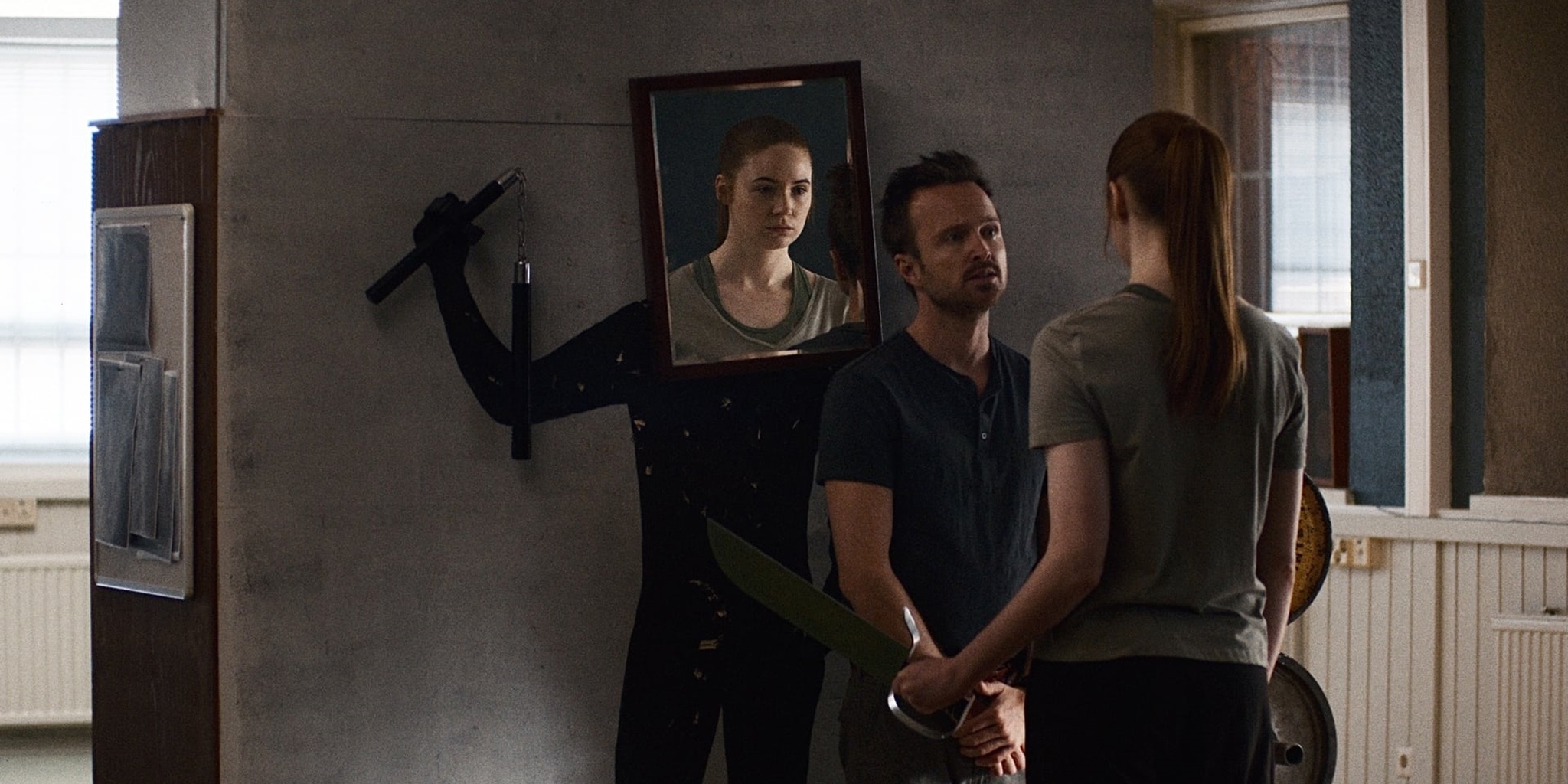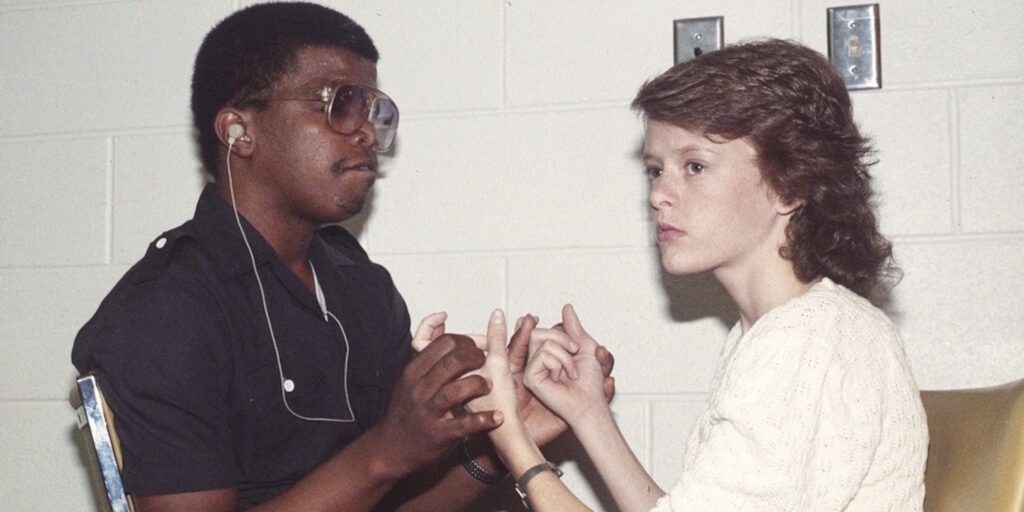[Originally published at Cinema St. Louis’ The Lens.]
Sarah is dying. After waking up in a pool of bloody vomit, she visits a gastroenterologist and receives the grim news: She has a rare, untreatable stomach disorder that will kill her in a matter of months, or even weeks. The process will be painless, the doctor reassures her, but her chances of survival are virtually nil. Not that Sarah (Karen Gillan) was doing much living before this dire prognosis. She supposedly has a job, but it is so inconsequential to her identity that the viewer never learns what exactly she does for a living. Her relationship with her critical, overbearing mother (Maija Paunio) is distant and tetchy. Her nights are spent gorging on fast food, half-heartedly masturbating, and having awkward, perfunctory video chats with her boyfriend, Peter (Beulah Koale), whose job takes him out of town for weeks at a time.
Perhaps it’s for the best that Sarah’s illness is incurable, as she doesn’t seem like much of a fighter. She accepts her fate with the dazed indifference of someone who is too unmotivated to indulge in self-pity. Since her imminent death is a certainty, Sarah’s doctor explains that she only has two meaningful decisions to make: What kind of funeral she wants, and whether to pursue Replacement. This isn’t the first sign that writer-director Riley Stearns’ dark comedy Dual unfolds in a faintly retro-futuristic alternate universe. There’s also a gruesome, perplexing prelude that gives the viewer a taste of the stakes to come. However, Replacement – a practice wherein terminal patients clone themselves to alleviate the grief of their family and friends – is such a ridiculous sci-fi conceit that it’s well served by Stearns’ deadpan, low-key approach.
Given her fraught family life and her lackluster romantic relationship, it’s not clear why Sarah opts for Replacement, beyond an ambivalent sense of obligation. It’s an expensive process, but the Replacement consultant brightly assures her that her clone will be saddled with the installment payments after she shuffles off her mortal coil. Sarah offers up a blob of saliva to the technicians and an hour later she’s presented with her double (also Gillan). As a lab-grown organism, the clone has less cellulite and sun damage than the original – and blue eyes, rather than Sarah’s brown, a genetic error that prompts the company to offer a 5% discount. Sarah is encouraged to let her replacement take over her life as soon as possible, to help ease the transition. On the car ride home, the clone peppers her with first-date questions: What is your favorite food? Music genre? Sexual position? However, there’s also a whiff of passive-aggressive condescension in the clone’s demeanor. When Sarah offers her a fresh outfit, the clone muses, “Maybe when you take me shopping, I’ll look for a different style.”
Ten months later, Sarah’s clone has settled comfortably and decisively into her life. However, Sarah is still very much alive, lurking awkwardly in the background like human wallpaper while Peter and her double cohabit in romantic contentment. (About to leave on a date with the man who is now her boyfriend, the clone announces, “Peter and I will make love later tonight. As you know, I tend to be loud, so I wanted you to be aware.”) Then the penny drops: Sarah’s doctor reveals that she has miraculously gone into remission and will make a full recovery. Non-terminal citizens are not permitted to maintain copies of themselves, so her clone must be decommissioned. However, the replacement Sarah has other ideas. Invoking the 28th Amendment to the Constitution, the clone petitions for a court-moderated duel to the death, a winner-takes-all gladiatorial match where the victor is judged the rightful owner of the contested identity. In the meantime, just to add insult to injury, Sarah is evicted and forced to pay alimony to her clone.
Brandishing an off-center sensibility and a sense of humor drier than grave dust, director Stearns (Faults, The Art of Self-Defense) is admittedly an acquired taste as comedy filmmakers go. Whether any given viewer will be on Dual’s wavelength depends on whether they can chuckle at Gillan delivering clipped, affectless lines like, “Between personal combat training, clone support, and hip-hop dance classes, money has been a little tight recently.” Jim Cummings (Thunder Road) and Miranda July (Me and You and Everyone We Know) are probably Stearns’ closest relations on the American-indie family tree, but there’s also something European about his chilly aesthetics and phlegmatic characters. Imagine an obscure Philip K. Dick story as adapted by Yorgos Lanthimos and you’re halfway there.
In Dual, this vibe is at least partly attributable to the film’s setting. Many of the people that Sarah encounters speak in British or Scandinavian accents, although the story ostensibly takes place in America. In truth, the film was shot on location in Tampere, Finland, a choice evidently motivated by that nation’s rigorous Covid-control policies, although it has the happy side effect of bestowing Dual with a faintly uncanny aura. The traffic circles and tastefully austere furniture contribute to a dislocated sense of place, while the vaguely 2000s-ish technology unmoor the film in time. Stearns is working in the mode of a fable here, more so than in his earlier features. This is fitting for a story about a woman whose circumstances might seem utterly ludicrous to an outside observer but are perfectly normal in the world that she inhabits. Or, if not normal, at least sufficiently commonplace that there exist support circles for the survivors of clone death matches. (Observing one of the lost souls in such a group, Sarah notes, “That guy obviously fucked his double.”)
Dual is more open to interpretation than Stearns’ The Art of Self-Defense, which presented a scathing but relatively straightforward indictment of toxic hyper-masculinity. Here, the filmmaker’s thematic palette is broader, his target less definite. Turn Dual one way and it seems to resolve into an allegory about the self-loathing that is arguably a necessary part of any self-improvement journey. Turn it another and it becomes a metaphor for the secret envies and resentments that parents often harbor toward their children – who are, after all, akin to little replacement selves created to alleviate the terror of mortality. Perhaps most obviously, the film functions as a satire of the cruel absurdity of the American legal and health-care systems, although Stearns seems to subvert this reading by having Sarah spell it out, bluntly and breathlessly: “The real enemy isn’t each other but the system that arbitrarily decides that only one of us can live and has us fight to the death as some sort of sick spectator sport.”
As with all of Stearns’ work, Dual would fall apart without a cast that is on the same absurdist page as the filmmaker. The ever-delightful Aaron Paul appears in a supporting role as Sarah’s poker-faced but supportive death-match trainer, whose methods includes a curriculum of violent horror movies to acclimate her to the sight of blood. Ultimately, however, the film rests on Gillan’s shoulders – both sets of them. Echoing Jake Gyllenhaal’s masterful dual performance in Enemy (2013), Gillan portrays Sarah and her clone not as contrasting reflections, but as characters so similar that their subtle distinctions create a jarring discord. She gamely delivers Stearns’ knowingly stilted dialogue like a humorless straight-A student rushing through an oral presentation, turning virtually every line into a delicious, bone-dry joke. Given the fame she’s garnered in glossy blockbuster action franchises, it’s an undeniable pleasure to watch Gillan almost single-handedly keep this oddball, stubbornly alienating black comedy afloat.
Dual will be available to rent on major online platforms on Friday, April 15.




